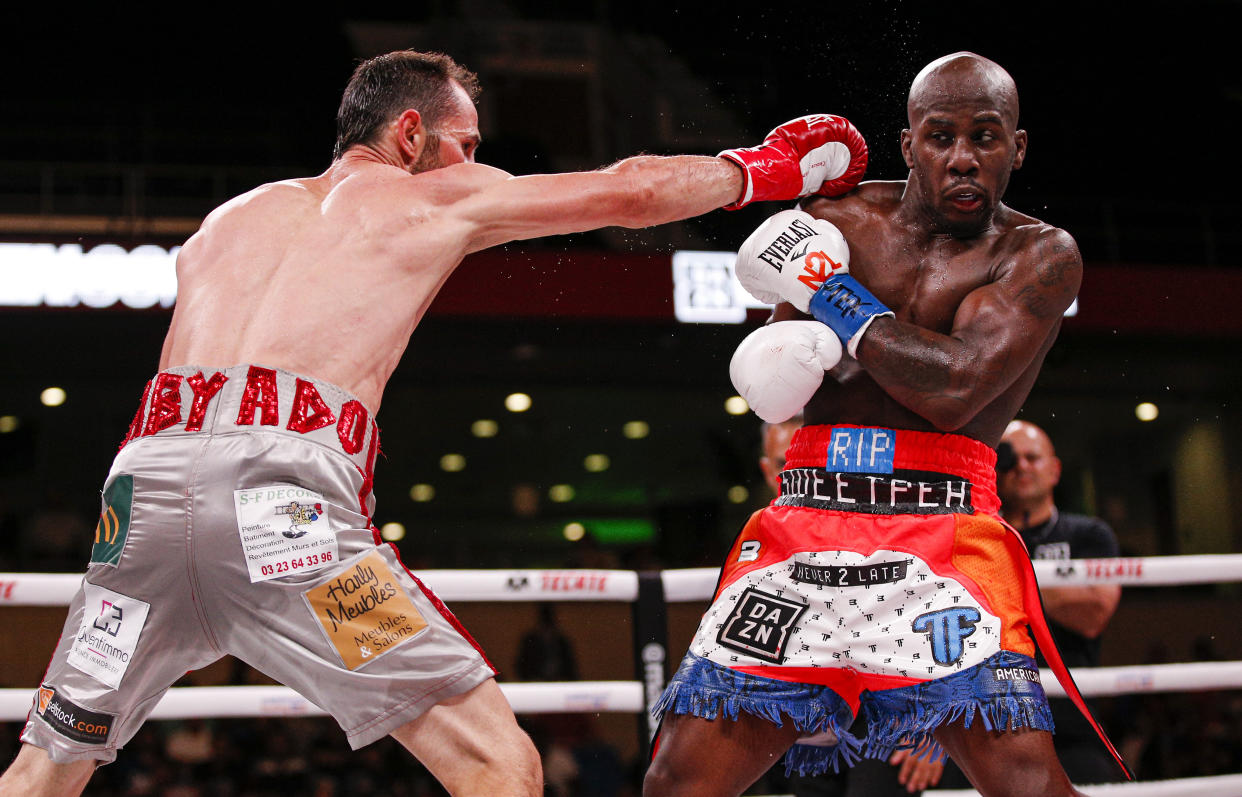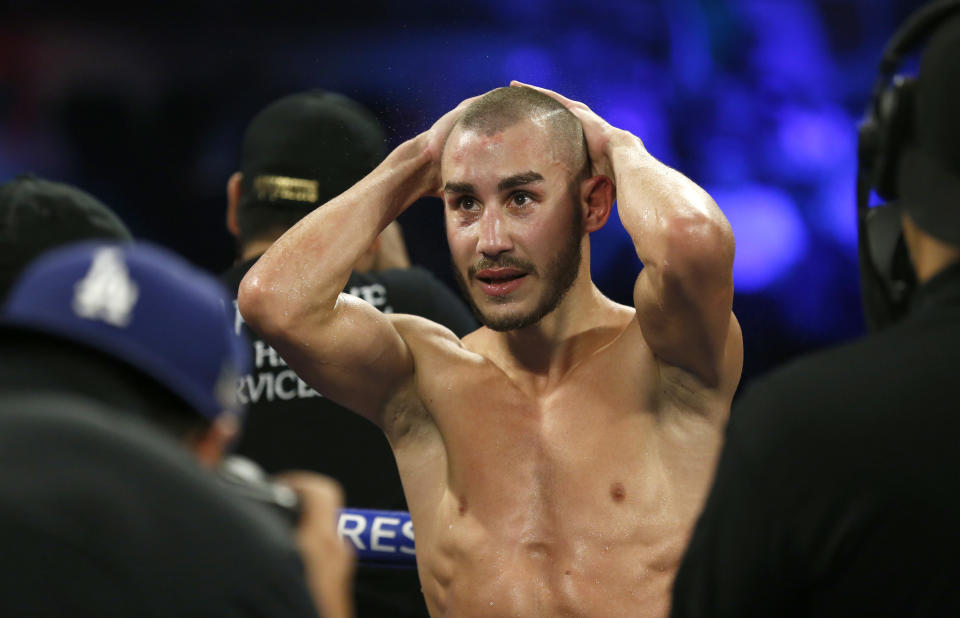A plea to the boxing community, in light of recent fighter deaths

The boos rained down upon Tevin Farmer from a very unhappy crowd at the College Park Center in Arlington, Texas, on Saturday, not long after he had successfully defended his IBF junior lightweight title with a one-sided unanimous decision over Guillaume Frenois.
Two of the judges scored nine of the 12 rounds for Farmer, who made the fourth successful defense of his title he won last August. The third judge gave Farmer all 12 rounds.
Frenois only landed 75 punches, and wasn’t able to hit Farmer with a clean punch to the head even when he had Farmer pinned in the corner and they were standing inches from each other.
Farmer put on a defensive clinic that would be akin to an NBA team holding its opponent to 70 points in the Finals. Farmer wore the legendary boxer Pernell Whitaker’s nickname, “Sweet Pea,” on his trunks in the fight to honor the fallen Hall of Famer. He also honored Whitaker with his defensive genius.
Farmer’s performance came four days after Maxim Dadashev died in a Maryland hospital of injuries he suffered in the ring during a July 19 fight and just two days after 23-year-old Hugo Santillán died following injuries he sustained in a July 20 fight in Buenos Aires, Argentina, against Eduardo Javier Abreu.

No one in the crowd thought much about either Dadashev or Santillán as they booed Farmer, who landed more than twice as many punches (167 to 75) than Frenois and who threw 33 percent more (636 to 425).
And, to be fair, there’s no requirement that they should have thought of them. Those who bought tickets are consumers who paid their own money to attend a professional sporting event. If they didn’t like what they saw, they have the absolute right to express their opinion by booing.
Understand, though, that Farmer did his job and he did it remarkably well. Those who didn’t find his performance entertaining are symptomatic of many of boxing’s problems rolled into one. The sport has suffered from self-immolation for decades, not years, and has lost much of its cache with the average person on the street.
The overwhelming majority of people today who identify as boxing fans are really just fans of slugfests, toe-to-toe exchanges that invariably bring those in attendance out of their seats. Slipping punches, making an opponent miss and then popping him in the nose with a jab before dancing away doesn’t appeal to most people.
The deaths of Dadashev and Santillán two days apart have cast a pall over the sport. It’s hard to imagine that the boxers fighting and the referees working the cards on Saturday in Arlington and across the country in Baltimore where Gervonta Davis stopped Ricardo Nunez in the second weren’t thinking of them.
Farmer sure was, and had no problem admitting it. He retweeted a reporter’s tweet about being entertaining, and he spoke words that many others think but aren’t so willing to repeat publicly:
More entertaining like take more risk. And more punches to the head. Just to be another fighter to suffer from brain injuries and possibly die just so I can be forgotten about a few months after. Nah. I dominated last night. Came home to my family unmarked and well❤️ GOD BLESS https://t.co/CcVlqzyzhA
— TEVIN FARMER (@TevinFarmer22) July 28, 2019
Promoters no longer promote the art of boxing because they know most fans don’t understand it and won’t like it.
In the wake of Whitaker’s untimely death on July 14 in Virginia Beach, Virginia, in a traffic accident, many fans speculated about how compelling a Whitaker bout with Floyd Mayweather might have been. It would have pitted two of the greatest defensive fighters ever against each other.
A bout between fighters with those kinds of styles would most likely not even be made today, because few would want to see it. The hardcore boxing fans, who appreciate the subtleties of the sport far more than most, would be intrigued, but the overwhelming percentage of the audience would be turned off by it.
Boxing is at its best not when it’s a toe-to-toe slugfest between two fighters with little skill, but rather when elite opponents like Sugar Ray Leonard and Thomas Hearns stand in front of each other and box. The skill level was extraordinarily high in their 1981 bout, but it had the kind of sustained action that draws people to the sport.
The problem is that there aren’t that many fighters skilled enough to fight that way. And so, to entertain the masses and make a bigger paycheck, they take risks that in many cases they aren’t entirely comfortable taking.
Farmer’s not comfortable taking those risks, and he knows that each time he throws a punch, it increases the possibility that he’ll be hit in return. So he finds a way to avoid punches, with superior head, shoulder and foot movement, and picks his spot when to throw his own offense.
But look what he did do: He threw 636 punches in 12 rounds against Frenois. That’s an average of 53 punches a round, or 17.3 punches a minute. That is one punch every 3.47 seconds of the bout.
He wasn’t throwing haymakers, because that’s another way to leave yourself wide open for a counter. Farmer was popping his jab a lot as he moved away from any danger Frenois posed. All 636 of those punches count, but they’re not as aesthetically pleasing to many as the powerful right hands and crushing left hooks.
The deaths of Dadashev and Santillán have shaken the sport to the core. Boxers need not die for our entertainment, but this is not a shot at boxing in any way.
Rather, it’s a plea:
A plea that we as fans and media keep in mind the very real risks every fighter, from the best to the worst, faces when they step into that ring. To accept that risk shows enormous courage and bravery.
A plea that promoters do a better job of educating existing fans and creating new ones by marketing the skill that is required to fight in the manner that boxers like Mayweather, Whitaker and, yes, even Farmer choose.
A plea that regulatory bodies review their requirements and pledge to work through the process of making them as strict as possible in regard to fighter safety, particularly with regard to pre-fight medical screening.
A plea not to boo a referee who stops a fight too soon. Understand, instead, what that referee is attempting to do and accept that it is always better to stop a fight too soon and leave a fighter and his fans angry rather than to wait so long and incur another tragedy in the ring.
And, finally, a plea to the boxers themselves to take their own care seriously. This means if you’re knocked out or knocked down or even “buzzed” in the gym, to talk to your coach and, if necessary, your doctor, to make sure you are safe to continue.
Far too many fighters bring injuries with them into the ring, from needlessly hard sparring.
Boxing is a great sport that has taken many young men and women off the streets and given them a quality of life they never could have dreamed of having without it.
But we can’t ignore what happened to Dadashev and Santillán and pretend like it won’t happen again. If we do, it’s going to happen again and again.
And that is completely unacceptable.
More from Yahoo Sports:


